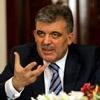Yet another taboo dies in ’Kurdistan’
Hürriyet Daily News with wires

refid:11281870 ilişkili resim dosyası
Gül's use of the word Kurdistan during his visit to Iraq has caused a flurry of criticism yesterday from the opposition back in Turkey.Main opposition Republican People’s Party, or CHP deputy leader and ex-diplomat Onur Öymen recalled that Gül was also optimistic when he visited Armenia. "Six months have passed and we still have nothing, and Armenia now has adopted a tougher stance."
While calling for stronger efforts to end terrorist activities by the outlawed Kurdistan Workers’ Party, or PKK, President Abdullah Gül became the first Turkish official to refer to northern Iraq as "Kurdistan." Speaking to Turkish journalists aboard his plane en route to Baghdad on Monday, Gül said the "Kurdistan Regional Administration" holds the primary responsibility for ending terrorist activities targeting Turkey. He also emphasized that an amnesty Ğ suggested by the prime minister of the regional administration in northern Iraq as a way to help resolve the PKK problem Ğ was a domestic concern for Turkey.
Asked by the press about his use of the term "Kurdistan," the president said it was the region’s official name, as articulated in the Iraqi constitution. "What shall I say? We do not refuse to say Macedonia because Greece refuses to do so," Gül said.
"This is written in the [Iraqi] constitution. It is a fact that those in northern Iraq should calculate the possible outcome of losing Turkey."
Gül’s statements were widely covered in the press and politicians across the political spectrum had much to say. "Iraqi constitution’s article seven stipulates the Iraqi government’s responsibility to fight terrorism. Does the president think of referring to that too? These initiatives do not. We do not remember that similar openings ended terror in other countries," CHP’s Öymen said.
"The Justice and Development Party government has caused a grave break in the fight against terrorism. The U.S. pressured and the EU incited the political solution approach," Nationalist Movement Party, or MHP deputy and former diplomat Deniz Bölükbaşı said. "Turkey downscaled its objectives in northern Iraq, giving up efforts to evict the PKK to be content with its disarmament. Now the unarmed separation attempts will continue," said Bölükbaşı. Democratic Party president Süleyman Soylu similarly depicted Gül’s uttering as a disclosure of "transoceanic plans."
"Did the president remember about the Iraqi constitution on the plane?" Bölükbaşı asked, referring to Gül’s advocacy of the word "Kurdistan" on the grounds that it is cited in the Iraqi constitution. Democratic Left Party, or DSP deputy general secretary Hasan Erçelebi demanded that the government explain what Gül meant by the word "Kurdistan" in a parliamentary assembly.
Only pro-Kurdish Democratic Society Party, or DTP, was pleased with Gül's uttering. DTP Şırnak deputy Hasip Kaplan welcomed the word Kurdistan, saying that it was an expression of the will to forge warmer ties with Kurds in Iraq. DTP’s Osman Özçelik said the term "northern Iraq cannot dissolve the Kurdistan reality."
Kurdish conference
Turkey does not recognize the semi-autonomous administration in northern Iraq by its official name due to concerns that this will eventually lead to the establishment of an independent Kurdish state within its own borders.
Kurdish groups based in Turkey, Iran, Iraq, Syria and Europe are expected to call on the PKK to disarm during a conference to be held in late April or May in the northern Iraqi city of Arbil. On the plane, Gül said Turkey considered the conference important. "This is the first action against violence. We’re following," he said. The conference will call on the PKK to drop weapons and start a political struggle, Bölükbaşı argued against the president. "The rank and file will deliver weapons to Barzani, the top cadre will move to Sweden and the remaining members will operate against Turkey in northern Iraq," Bölükbaşı said.
On the second day of his Baghdad visit, Gül met with the prime minister of the regional administration, Nechirvan Barzani, who said the PKK problem cannot be resolved through military means. He called on Turkey to grant amnesty to members of the terror group, but Gül said an amnesty was Turkey’s domestic problem. "I don’t talk this over with others," he was quoted as saying yesterday by the private channel NTV.
At a joint press conference Monday with his Iraqi counterpart, Talabani, Gül called for greater cooperation from Iraqi Kurdish leaders. "The time has come to remove the element that is a source of trouble," he said. "We need to engage in a joint struggle to completely eradicate terrorism. A comprehensive cooperation is required, but there is no doubt that a greater responsibility falls on the [region] where the terrorist organization’s leadership and camps are based."
Talabani said the removal of the PKK was in Iraq’s interest as well and called on the group’s members to lay down their arms. "Either they will lay down arms or they will leave our territory," he said.
















